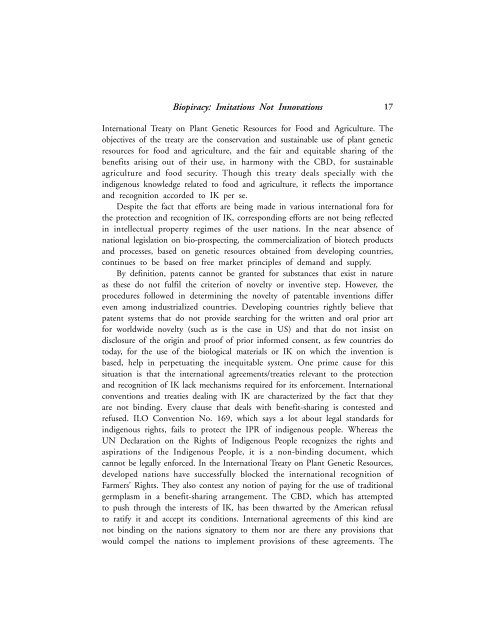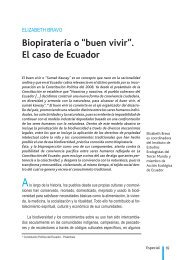BIOPIRACY Imitations Not Innovations - Biopirateria
BIOPIRACY Imitations Not Innovations - Biopirateria
BIOPIRACY Imitations Not Innovations - Biopirateria
Create successful ePaper yourself
Turn your PDF publications into a flip-book with our unique Google optimized e-Paper software.
Biopiracy: <strong>Imitations</strong> <strong>Not</strong> <strong>Innovations</strong> 17<br />
International Treaty on Plant Genetic Resources for Food and Agriculture. The<br />
objectives of the treaty are the conservation and sustainable use of plant genetic<br />
resources for food and agriculture, and the fair and equitable sharing of the<br />
benefits arising out of their use, in harmony with the CBD, for sustainable<br />
agriculture and food security. Though this treaty deals specially with the<br />
indigenous knowledge related to food and agriculture, it reflects the importance<br />
and recognition accorded to IK per se.<br />
Despite the fact that efforts are being made in various international fora for<br />
the protection and recognition of IK, corresponding efforts are not being reflected<br />
in intellectual property regimes of the user nations. In the near absence of<br />
national legislation on bio-prospecting, the commercialization of biotech products<br />
and processes, based on genetic resources obtained from developing countries,<br />
continues to be based on free market principles of demand and supply.<br />
By definition, patents cannot be granted for substances that exist in nature<br />
as these do not fulfil the criterion of novelty or inventive step. However, the<br />
procedures followed in determining the novelty of patentable inventions differ<br />
even among industrialized countries. Developing countries rightly believe that<br />
patent systems that do not provide searching for the written and oral prior art<br />
for worldwide novelty (such as is the case in US) and that do not insist on<br />
disclosure of the origin and proof of prior informed consent, as few countries do<br />
today, for the use of the biological materials or IK on which the invention is<br />
based, help in perpetuating the inequitable system. One prime cause for this<br />
situation is that the international agreements/treaties relevant to the protection<br />
and recognition of IK lack mechanisms required for its enforcement. International<br />
conventions and treaties dealing with IK are characterized by the fact that they<br />
are not binding. Every clause that deals with benefit-sharing is contested and<br />
refused. ILO Convention No. 169, which says a lot about legal standards for<br />
indigenous rights, fails to protect the IPR of indigenous people. Whereas the<br />
UN Declaration on the Rights of Indigenous People recognizes the rights and<br />
aspirations of the Indigenous People, it is a non-binding document, which<br />
cannot be legally enforced. In the International Treaty on Plant Genetic Resources,<br />
developed nations have successfully blocked the international recognition of<br />
Farmers’ Rights. They also contest any notion of paying for the use of traditional<br />
germplasm in a benefit-sharing arrangement. The CBD, which has attempted<br />
to push through the interests of IK, has been thwarted by the American refusal<br />
to ratify it and accept its conditions. International agreements of this kind are<br />
not binding on the nations signatory to them nor are there any provisions that<br />
would compel the nations to implement provisions of these agreements. The



